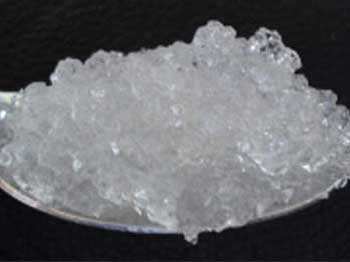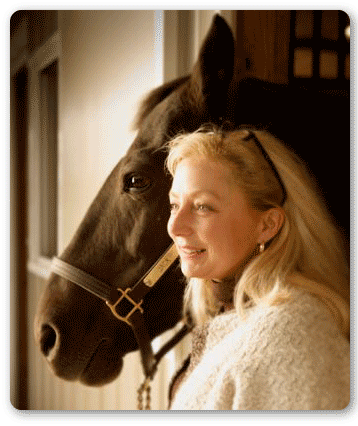The Low-Down on Dust-Down

While indoor arenas are great, they also have some unique problems. A few problems associated with riding indoors include over-crowding, cramped spaces, and dust in the air. Scheduling riding times can help with the over-crowding, allowing ample space for each rider. However, dust in the air is not only an inconvenience, but is also a health issue. Dusty arenas do take a little work to fix, but by making a few changes, the air will be much cleaner.
In the past, people used numerous methods to keep dust down. While mixing used motor oil with footing may be effective, the EPA warns against it, and some oils can be harmful to horses. Additionally, the practice of mixing calcium chloride into footing can damage wood and metal, taking a negative toll on buildings. Calcium chloride can also cause "scratches", an irritation that can form on the backside of the pasterns, running all the way down to the hoof.
Another method some have used to keep dust down is to add foreign particles such as wood chips or rubber. Wood chips do a good job but break down easily, and larger pieces can get stuck in the hoof alongside the frog or shoe. Rubber particles may not meet local fire code, as rubber can be extremely flammable. Plus, since rubber is "springy," if a horse that is used to rubber footing is put on another type of footing, the horse may not be able to stride out as well. Additionally, any time a footing is added to dirt or sand, eventually the dirt will break down and you are back to... the dust problem. A good, well-draining sand or sand/clay mix that can be dampened and conditioned is probably the best footing choice. Check to see what's available in your area.
Keeping sand footing at its best requires some maintenance.
The arena should be cleaned of manure piles and groomed on a regular basis. Regular watering is the best way to keep dust down, and the amount of time spent watering will depend on arena usage. Constantly watering can be time-consuming, especially if water has to be hauled in. A good solution to keeping the dust levels low is to use a dust-down product. Terra-Sorb is a dust-down/dust-reducing product that has many benefits to the rider. Not only is it effective at keeping the air cleaner, in the winter it can also prolong riding time as it reduces the freezing temperature of treated footing to 22°F. Jumping can continue, as slick spots do not occur with Terra-Sorb. Compaction is also greatly reduced because of the way Terra-Sorb works.
Terra-Sorb is a granule that expands ten times its normal size when wet, absorbing everything around it.
Since it holds water, footing does not get hard around the Terra-Sorb "beads," so compaction is virtually eliminated. Plus, as the Terra-Sorb eventually shrinks back down, it releases the water, keeping the ground softer by breaking it up. Jim McCartney of Rainmaker Stables in Ottawa Lake, Michigan, uses Terra-Sorb and went from watering 3.5 hours every five days to only 1.5 hours once a month. His facility boards hunters and jumpers, ropers, and occasionally hosts cutting horses, so the arena gets a lot of use. The arena is kept clean and regularly groomed, and dust is virtually nonexistent. Once properly applied, Terra-Sorb will be effective year round.
We suggest getting the top "dust" out of the arena to get back to your dirt.
If needed, you can bring in some "faceted" sand (sand that will not break down easily) to top your arena. Water the arena, and then spread the Terra-Sorb. You can use a simple grass seeder for even application. Lightly drag your arena, then water one more time. Even out footing and keep your arena groomed with a track and ring conditioner. Your arena will look like the show ring of your dreams! ??It is so important to keep footing in tiptop shape; poor footing not only creates dust, but can cause lameness and soreness as well. The old adage "No hoof, no horse" is right on the money. By using the proper footing and maintaining it well, you will be able to use your arena to your best advantage.
 Debbie has over 45 years experience with horses and equine-related businesses. She has owned, trained, boarded horses and run stables at various times in her career. She is a certified fence installer, has given balanced riding lessons, and has shown horses in Western, Western Pleasure, Trail, English, Hunter/Jumper, Fox Hunting, Hunter Trials, Dressage and driving classes. Debbie has been involved in foaling, and just about every aspect of horse ownership possible, and she welcomes your questions and comments. If you are interested in using any articles by Debbie, please send her an email.
Debbie has over 45 years experience with horses and equine-related businesses. She has owned, trained, boarded horses and run stables at various times in her career. She is a certified fence installer, has given balanced riding lessons, and has shown horses in Western, Western Pleasure, Trail, English, Hunter/Jumper, Fox Hunting, Hunter Trials, Dressage and driving classes. Debbie has been involved in foaling, and just about every aspect of horse ownership possible, and she welcomes your questions and comments. If you are interested in using any articles by Debbie, please send her an email.
RAMM Fence Systems, Inc. makes every effort to provide reliable and useful information on horse health, care and products. The statements made on this website are based on years of experience with horses, however, they are based on generalized situations and should not replace diagnosis or treatment by a veterinarian or consultation by a professional. RAMM Fence Systems, Inc. does not assume any legal responsibility. Readers should always consult qualified health care providers for specific diagnosis and treatment.
